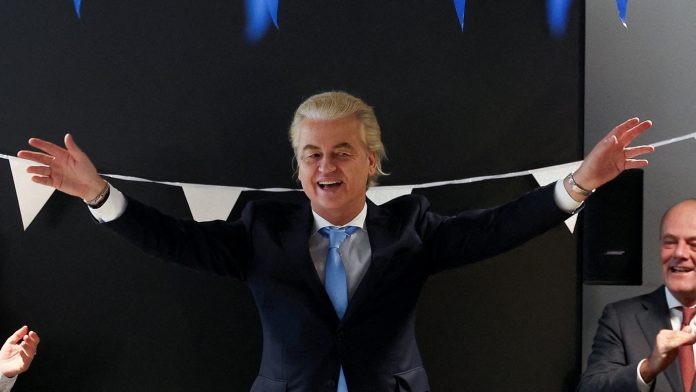Radiance News Service
Nov. 30: Geert Wilders – far-right politician, Dutch populist, Incendiary Islamophobic political actor, ethnonationalist – and now, the leader of the largest party in the Dutch Parliament. Although he seems to be staring at a dicey start to his possible Prime Ministership, the political bombshell has certainly sent a wave of concern throughout Europe and the Muslim world due to what Wilders symbolizes and his rigid positions.
Wilders’s Party for Freedom (PVV) has emerged as the single largest party with 37 seats in the 150-member lower house. The Labour-Green coalition won 25 seats, while the incumbent People’s Party for Freedom and Democracy (VVD) secured 24. While this does not constitute in any way a convincing majority, the numbers have set off alarm bells. The talks of him staking claim through a minority cabinet arose after the election when the conservative VVD Party of outgoing Prime Minister Mark Rutte – which otherwise shares many of Wilders’ anti-immigration positions – said it would not join a Wilders-led Cabinet but did not exclude offering him outside support.
Consequently, Wilders, whose party won around 24% of the vote, is now seeking more moderate partners and might have to sacrifice some of his earlier manifesto promises. In recent days, he has promised to be a Prime Minister for all Dutch citizens, thus appearing to moderate his previous position against Muslims due to electoral compulsions.
However, Wilders’ immediate future is not secure as his campaign team suffered a major blow Monday, when his ‘scout’ who was hired to oversee coalition talks quit citing fraud allegations. Many of Wilders’ potential allies are very wary of his strident anti-Islam, anti-immigration rhetoric, as well as his anti-EU stand. In the campaign, Wilders stressed his flexibility on certain positions, but the PVV manifesto calls for a ban on mosques, Qurans and headscarves.
As Asim Ali wrote in The Telegraph, “Even though many far-Right European parties borrow certain Islamophobic tropes, Wilders is quite distinctive in defining his political agenda in terms of defending the Netherlands (and Europe) against the mortal threat coming from Islam and Muslims. He wrote the political tract, Marked for Death: Islam’s War Against the West and Me, in which he collects various accounts of death and destruction ascribed to Islam since its foundation.”
Last year, Wilders had Tweeted: “Please India as a friend I tell you: stop being tolerant to the intolerant. Defend Hinduism against the extremists, terrorists and jihadists. Don’t appease Islam, for it will cost you dearly. Hindus deserve leaders that protect them for the full 100%!”
According to analysts, however, even if he scraps most of his hardline positions, it may not be enough to convince potential coalition partners. Wilders also has a conviction for insulting Moroccans and was refused entry to the UK.
According to Jon Henley, Europe correspondent of the Guardian, “Whole swathes of Wilders’ manifesto are unacceptable to potential coalition partners, or simply illegal. Among other pledges, it promised a “Nexit” referendum on leaving the EU, a return to the guilder (the pre-euro currency) and an end to the free movement of EU workers.”
The Fidesz Party in Hungary, the Law and Justice Party in Poland, Giorgia Meloni in Italy, the Sweden Democrats, Marine Le Pen in France, Vox in Spain and AfD in Germany all are examples of far-right or right-wing parties that have gained prominence across Europe, campaigning of a variety of issues such as traditional values, immigration control, anti-immigration policies, Euroscepticism, cultural integration and anti-Muslim rhetoric.
For Dutch Muslims and the broader world, it is currently a wait-and-watch situation as Wilders negotiates the thorny world of Dutch coalition politics. The Hindu’s editorial on 27th November summed it up well:
“His rise is in line with the rise of far-right parties and populists across Europe. This should be a wake-up call for the establishment parties in the West. The far-right is using the immigration and the cost-of-living crises to mobilise the public under its exclusive, ethno-nationalist brand of politics, while the political centre is struggling to hold. Establishment parties should have a clear economic agenda and political vision to arrest the rising tide of far-right politics, which echoes Europe’s dangerous and not-so-distant past.”
With 2024 around the corner, and elections due in large democracies such as India and the US, similar questions must be pondered upon across the globe.




